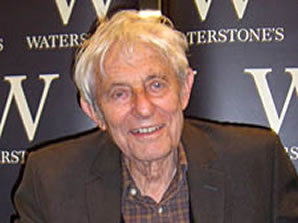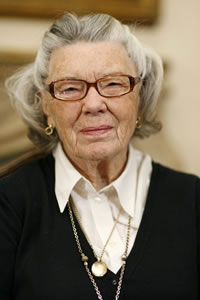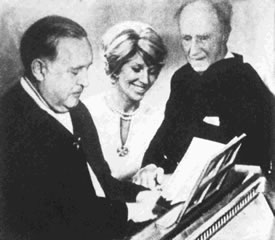De Britse schrijfster Fay Weldon werd geboren op 22 september 1931 in Alvechurch, Engeland. Zie ook alle tags voor Fay Weldon op dit blog.
Uit: Big Girls Don’t Cry
“Stephanie doesn’t get the joke. This is her life problem. Her life asset is her beauty. In 1971 she is twenty-five; she has perfect features, a lanky body, abundant blonde straight hair, and rather large hands and feet. Layla is twenty-six, shorter, plumper, funnier; she has curly dark hair. One side of Layla’s face does not line up with the other, so she is called sexy and attractive, but seldom beautiful. Layla does not regard this as a life problem. She has too much to think about.
The posters declare over and over, A Woman Needs a Man like a Fish Needs a Bicycle. People stare a moment and pass on. The message makes no sense. Obviously women need men. Everyone needs men. Masculinity is all. Armies need men, and government and business and technology and high finance. And teaching and medicine and adventuring and fashion. And all the serious arts. Offices, except for the typing pool, which is female, need men. It’s homes which need women, except for the lawn which is male. Women are for sex, motherhood and domesticity. Men are in for status and action. Outside the home is high status, inside the home is low status. In popular myth men make decisions, women try on hats. The world is all id and precious little anima. Layla and Stephie, friends, mean to change all this. A Woman Needs a Man like a Fish Needs a Bicycle. Ho, ho, ho. Everyone knows women compete for male attention; isn’t this how the problem of female bitchery arises? Catty? Felines are nothing compared with women. Perhaps this puzzle poster is advertising something?
A couple of tourists, Brian and Nancy from New Zealand, emerge from the crowds in Carnaby Street. They have been rendered punch-drunk by colour, fabric, and the smell of patchouli. These are still flower-power and drug days. See feather boas, silk caftans, crushed velvet hats; lots of mauve, flares, miniskirts, platform heels; good-looking guys with lots of hair, girls with doll faces drifting behind them; wide eyes, fake lashes, white faces. Brian and Nancy both wear white Aertex shirts and tennis shoes for ease and comfort. Both are in culture shock. They flew in today from Wellington. (It took thirty-six hours.) They are accustomed to mountains, plains and sheep farms. Brian is gloriously handsome and golden. Nancy is pleasing enough to look at, but lacks eroticism: she’s tall, long-limbed, and manages to appear gawky rather than slender.”

Fay Weldon (Alvechurch, 22 september 1931)
Cover
De Britse schrijfster Rosamunde Pilcher werd op 22 september 1924 geboren in Lelant, Cornwall, Groot-Brittannië. Zie ook alle tags voor Rosamunde Pilcher op dit blog.
Uit: The Shell Seekers
“She sometimes thought that for her, Nancy Chamberlain, the most straightforward or innocent occupation was doomed to become, inevitably, fraught with tedious complication.
Take this morning. A dull day in the middle of March. All she was doing … all she planned to do … was to catch the 9:15 from Cheltenham to London, have lunch with her sister Olivia, perhaps pop into Harrods, and then return home. There was nothing, after all, particularly heinous about this proposal. She was not about to indulge in a wild orgy of extravagance, nor meet a lover; in fact, it was a duty visit more than anything else, with responsibilities to be discussed and decisions made, and yet as soon as the plan was voiced to her household, circumstances seemed to close ranks, and she was faced with objections, or, worse, indifference, and left feeling as though she were fighting for her life.
Yesterday evening, having made the arrangement with Olivia over the phone, she had gone in search of her children. She found them in the small living room, which Nancy euphemistically thought of as the library, sprawled on the sofa in front of the fire, watching television. They had a playroom and a television of their own, but the playroom had no fireplace and was deathly cold, and the television was an old black-and-white, so it was no wonder they spent most of their time in here.
“Darlings, I have to go to London tomorrow to meet Aunt Olivia and have a talk about Granny Pen …”
“If you’re going to be in London, then who’s going to take Lightning to the blacksmith to be shod?”
That was Melanie. As she spoke, Melanie chewed the end of her pigtail and kept one baleful eye glued to the manic rock singer whose image filled the screen. She was fourteen and was going through, as her mother kept telling herself, that awkward age.
Nancy had expected this question and had her answer ready.
“I’ll ask Croftway to deal with that. He ought to be able to manage on his own.”
Croftway was the surly gardener-handyman who lived with his wife in a flat over the stables. He hated the horses and constantly spooked them into a frenzy with his loud voice and uncouth ways, but part of his job was helping to cope with them, and this he grudgingly did, manhandling the poor lathered creatures into the horse-box, and then driving this unwieldly vehicle across country to various Pony Club events. On these occasions Nancy always referred to him as “the groom.”

Rosamunde Pilcher (Lelant, 22 september 1924)
Scene uit de gelijknamige tv-film uit 1989 met o.a. Angela Lansbury als Penelope Keeling (rechts)
De Hongaarse dichter en schrijver György Faludy werd geboren op 22 september 1910 in Boedapest. Zie ook alle tags voor György Faludy op dit blog.
Ballade de celui qui n’est fils de personne
Comme un grand chapeau, le ciel bleu m’a recouvert,
et il s’est trouvé pour moi un seul ami fidèle: le brouillard.
Parmi des plats garnis la faim m’a saisi,
et j’ai eu froid à en mourir devant des poêles chauffés au rouge.
Là où j’ai mis la main, il n’y avait que des tuiles qui tombaient,
et la boue montait jusqu’à atteindre le bord de ma bouche,
près de ma route les roses mouraient
et mon souffle rendait l’été terne,
je m’étonne déjà presque de la lumière du jour,
de ce qu’elle brille encore parfois sur mes épaules en haillons,
moi qui ai parcouru tous les six mondes,
partout béni et partout cible de crachats.
J’ai lutté contre le vent dans les champs gelés,
mon vêtement n’est qu’une feuille de vigne,
rien n’est plus pur pour moi que la nuit,
rien n’est plus sombre pour moi que le midi.
J’ai éclaté en sanglots au fond des tavernes de marins,
de même que je ris dans les cimetières;
ce que j’ai est seulement ce que j’ai jeté dans la boue,
et j’ai tué tout ce que j’aime.
Avec son givre blanc, l’automne s’est déjà couché
sur mes tempes et mes cheveux roux comme le feu,
et je vais ainsi, sifflotant tout seul,
partout béni et partout cible de crachats.
Le ciel victorieux a posé sa tente sur moi,
la rosée a coloré de bleu mon front,
et c’est ainsi que j’ai poursuivi Dieu, qui a reculé,
et poursuivi l’avenir, qui est comme mon foyer.
Je me suis reposé des heures sur les sommets montagneux
et j’ai regardé avec admiration le casseur de pierres en sueur,
mais je suis passé en sifflotant près des cathédrales
et je me suis moqué de l’évêque aux vêtements ornés,
et pour cela il n’est tombé que baisers et coups de cravache
sur mon pauvre corps, qui s’est couché tout pareillement
parmi les coussins brodés et dans la boue des rues,
partout béni et partout cible de crachats.
Et bien que je n’aie ni maison, ni vin, ni épouse
et que le vent me siffle entre les jambes,
j’aurai encore de l’argent, et j’espère avec certitude
qu’un jour tout me réussira.
Et quand je serai lassé de manger dans des plats en or,
j’abandonnerai encore une fois les palais,
les vers danseront déjà la gigue pour atteindre mon ventre,
et quelque part sur les feuilles mortes d’automne,
au pied d’un vieux buisson d’épines sur lequel ne brillera
que la lumière douteuse d’une mauvaise étoile,
c’est là qu’un jour je resterai, François Villon, couché,
partout béni et partout cible de crachats.

György Faludy (22 september 1910 – 1 september 2006)
De Hongaarse acteur Turek Miklós presenteerde leven en werk van György Faludy tijdens een theatervoorstelling in Őriszentpéter, 2004
De Duitse dichter en schrijver Hans Leip werd geboren op 22 september 1893 in Hamburg. Zie ook alle tags voor Hans Leip op dit blog.
Uit: Die Nächtezettel der Sinsebal
“(Sinsebal tanzt vor einem Spiegel in ihrer einsamen Stube)
Dann tanze ich das Spiegellied. Das Spiegellied? Oho! Was weiß mein Bein von mir? Was weiß mein Nacken von mir? Was weiß die weiße Haut? Der Vorhang ist zu, der Teppich grau und ein einziger Kuß. Da schläft mein Bett allein. Nein, gaffen die Kissen? Und pumpen die Puppen im Stuhl in der Kuhle die Mäuler zum Wundern rund? Die Berge schmunzeln auf den Bildern. Was macht die Lampe denn? Die Lampe macht sich winzig, rennt in mein Knotenhaar, brennt in mein Bronzepudelhaar, ein Edelstein, mein süßer Karfunk!
Ei Fürstin, ei Engelbengel, hü! Ei Töchterlein, ei Schmatz, mein Schatz!
Nun neigen sich die Arme sehr, die Schultern schleichen hinterdrein. Nun schlüpft das Knie davon, nun ruft das andre zärtlich nach. Schnipp, macht der Finger.
Nun heben sich die Zehen, tirili. Nun scharwenzen die Hüften juja, nun klingeln ting, ting die Brüstelein.
Nun stülpt eine Glocke über mich. O schwanker Trunk, dunkles Blau! Wer schwingt mich so, o halt, nein! O ja, schön! Noch fängt mich der Spiegel, steif grapst mich sein Mantel, nun klemmt er nicht mehr, schmal bin ich ihm weg, fängt mich nicht, fängt mich nicht! Nun Kreisel, nun Mond im Griff. Wirft mich ein Gaukler? Ein Walfisch schnappt mich. Feuer ist, Feuer ist! O schauert mich Eis!
Nun kreiseln die Wiesen, viel Blumen wie Mücken, die Schwalben, die Rehe, o schwindelnder Duft; nun häng’ ich im Wind, wie Zweige geschaukelt, wie Blätter geschleudert, wie Sternschnuppen blank. Nun schieß’ ich hinauf, o dunkel, o sausend, nun schluckt mich die Sonne, nun ist sie mein Tanzrad, ist toll, ist toll, o Fieber, ich brenne! Zu Regenbögen gestriemt die Wände, die Puppen, die Stühle, mein Hemd, meine Kissen, mein Bett, meine Bücher, ich schwebe, ich falle!”

Hans Leip (22 september 1893 – 6 juni 1983)
De Israëlische Hebreeuwse en Jiddische dichter en politicus Uri Zvi Greenberg werd geboren op 22 september 1896 in Bialikamin, Lviv, in Galicië, destijds behorend tot Oostenrijk-Hongarije. Zie ook alle tags voor Uri Zvi Greenberg op dit blog.
We Were Not Likened To Dogs
We were not likened to dogs among the Gentiles—by them a dog is pitied
Caressed and even kissed by the Gentile mouth, for like the puppy
Beloved of his home, he is fondled and rejoiced in always:
And when this dog dies—how very much the Gentile mourns him!
We were not led like sheep to the slaughter in the boxcars
For like leprous sheep they led us to extinction
Over all the beautiful landscapes of Europe… .
The Gentiles did not handle their sheep as they handled our bodies:
Before slaughter they did not pull out the teeth of their sheep:
They did not pluck the wool from their bodies as they did to us:
They did not push the sheep into the fire to make ashes of the living
And to scatter the ashes over rivers and sewers.
Are there other parables like this, our catastrophe, that came to us from their hands?
There are no other parables (all words are shades of shadow)—
And therein is the horror-striking expression: There are no other parables!
Every cruel torture that man may yet do to man in a Gentile country,
The future fashioner of parables will liken so: He was tortured like a Jew.

Uri Zvi Greenberg (22 september 1896 – 8 mei 1981)
Portret uit 1942
De Duitse dichter Barthold Heinrich Brockes werd geboren in Hamburg op 22 september 1680. Zie ook alle tags voor Barthold Heinrich Brockes op dit blog.
Gedanken bey dem Fall der Blätter im Herbst
In einem angenehmen Herbst, bey ganz entwölktem heiterm Wetter,
Indem ich im verdünnten Schatten, bald Blätter-loser Bäume, geh′,
Und des so schön gefärbten Laubes annoch vorhandnen Rest beseh′;
Befällt mich schnell ein sanfter Regen, von selbst herabgesunkner Blätter.
Ein reges Schweben füllt die Luft. Es zirkelt, schwärmt′ und drehte sich
Ihr bunt, sanft abwärts sinkend Heer; doch selten im geraden Strich.
Es schien die Luft, sich zu bemühn, den Schmuck, der sie bisher gezieret,
So lang es möglich, zu behalten, und hindert′ ihren schnellen Fall.
Hiedurch ward ihre leichte Last, im weiten Luft-Kreis überall,
In kleinen Zirkelchen bewegt, in sanften Wirbeln umgeführet,
Bevor ein jedes seinen Zweck, und seiner Mutter Schooß, berühret;
Um sie, bevor sie aufgelöst, und sich dem Sichtlichen entrücken,
Mit Decken, die weit schöner noch, als persianische, zu schmücken.
Ich hatte diesem sanften Sinken, der Blätter lieblichem Gewühl,
Und dem dadurch, in heitrer Luft, erregten angenehmen Spiel,
Der bunten Tropfen schwebendem, im lindem Fall formiertem, Drehn,
Mit offnem Aug′, und ernstem Denken, nun eine Zeitlang zugesehn;
Als ihr von dem geliebten Baum freywilligs Scheiden (da durch Wind,
Durch Regen, durch den scharfen Nord, sie nicht herabgestreifet sind;
Nein, willig ihren Sitz verlassen, in ihren ungezwungnen Fällen)
Nach ernstem Denken, mich bewog, sie mir zum Bilde vorzustellen,
Von einem wohlgeführten Alter, und sanftem Sterben; Die hingegen,
Die, durch der Stürme strengen Hauch, durch scharfen Frost, durch schwehren Regen
Von ihren Zweigen abgestreift und abgerissen, kommen mir,
Wie Menschen, die durch Krieg und Brand und Stahl gewaltsam fallen, für.
Wie glücklich, dacht′ ich, sind die Menschen, die den freywillgen Blättern gleichen,
Und, wenn sie ihres Lebens Ziel, in sanfter Ruh′ und Fried′, erreichen;
Der Ordnung der Natur zufolge, gelassen scheiden, und erbleichen!

Barthold Heinrich Brockes (22 september 1680 – 16 januari 1747)
Cover























